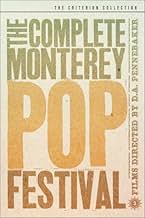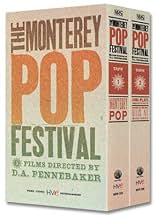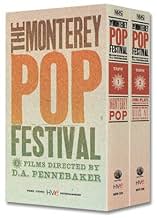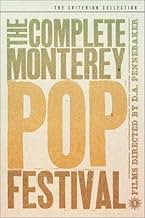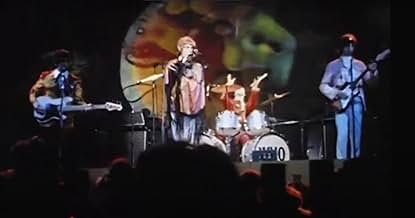AVALIAÇÃO DA IMDb
7,9/10
5,2 mil
SUA AVALIAÇÃO
Um filme sobre o maior festival de rock pré-Woodstock.Um filme sobre o maior festival de rock pré-Woodstock.Um filme sobre o maior festival de rock pré-Woodstock.
- Prêmios
- 1 vitória e 2 indicações no total
Country Joe McDonald
- Performers
- (as Country Joe and The Fish)
Denny Doherty
- Performers
- (as Mamas and the Papas)
Cass Elliot
- Performers
- (as Mamas and the Papas)
The Mamas and the Papas
- Themselves
- (as Mamas and Papas)
John Phillips
- Performers
- (as Mamas and the Papas)
Michelle Phillips
- Performers
- (as Mamas and the Papas)
Frank Cook
- Performers
- (as Canned Heat)
Bob Hite
- Performers
- (as Canned Heat)
Henry Vestine
- Performers
- (as Canned Heat)
Alan Wilson
- Performers
- (as Canned Heat)
Art Garfunkel
- Performers
- (as Simon and Garfunkel)
Paul Simon
- Performers
- (as Simon and Garfunkel)
Avaliações em destaque
There was a time in 1969 when a friend and I went to see Monterey Pop every Friday night at the Kips Bay Cinema in NYC just to hear Janis sing Ball and Chain and Otis sing I've been Lovin You Too Long. Then we'd go to dinner and maybe another movie, but it set up our entire weekend.
Now, I think about how many of the performers were gone too soon, too young -- Janis, Jimi, Otis, Mama Cass... How amazing to have them all there in this one glorious celebration of music and the innocence (yes) of the 60's.
Maybe it's not the best "film-making" but it's a treasure to be appreciated as the years go by. Would love to see a DVD release with any additional available footage. Enjoy and remember, (or discover)
Now, I think about how many of the performers were gone too soon, too young -- Janis, Jimi, Otis, Mama Cass... How amazing to have them all there in this one glorious celebration of music and the innocence (yes) of the 60's.
Maybe it's not the best "film-making" but it's a treasure to be appreciated as the years go by. Would love to see a DVD release with any additional available footage. Enjoy and remember, (or discover)
I found this documentary on DVD at my local library.
I know all about the 1960s, I graduated from high school, I graduated from college, I completed my graduate studies, I got married, I started my career, I had my first child. She will be 49 later this year, 2018.
But I never went to any music festivals. So finding this film on DVD was a joy. It has a good mix of on-stage performances and views of the mostly young crowd away from the stage. While I didn't know any of them I recognize all of them. That is how we looked and behaved in the late 1960s.
Funny, when I was younger I avoided Janis Joplin, I just hated her singing style. But I saw a documentary on her, I became a fan of sorts. And here at roughly 25 minutes into the documentary she performs "Ball and Chain" which was a real show-stopper., showing her extremely wide range of talent. There is a memorable shot of Mama Cass Elliot in the crowd mouthing "WOW" when Janis' performance was over.
Anyway, good film that brings back good memories.
I know all about the 1960s, I graduated from high school, I graduated from college, I completed my graduate studies, I got married, I started my career, I had my first child. She will be 49 later this year, 2018.
But I never went to any music festivals. So finding this film on DVD was a joy. It has a good mix of on-stage performances and views of the mostly young crowd away from the stage. While I didn't know any of them I recognize all of them. That is how we looked and behaved in the late 1960s.
Funny, when I was younger I avoided Janis Joplin, I just hated her singing style. But I saw a documentary on her, I became a fan of sorts. And here at roughly 25 minutes into the documentary she performs "Ball and Chain" which was a real show-stopper., showing her extremely wide range of talent. There is a memorable shot of Mama Cass Elliot in the crowd mouthing "WOW" when Janis' performance was over.
Anyway, good film that brings back good memories.
10eddiez61
I wasn't at Monterey in '67, and neither were 99.999% of the people now commenting on this film. To read so many of these comments you'd think that the entire audience was now online and writing reviews. They criticize the song selections, the blaring omissions, the crowd scene inserts, and even the haircuts. They seem to be saying that this film doesn't quite present an accurate picture of the unprecedented 3 day phenomenon that was the Monterey Pop Festival. Well, WHAT would present an accurate picture of that amazing event? I suppose, maybe, hearing someone who was ACTUALLY there tell us his or her story of those wild days. Someone like, I dunno... D.A. Pennebaker? Hey, right, he WAS there, and this film is HIS story (history). At only 78 or so minutes it's more so his impression, his true reaction, in condensed user friendly form, like a good story is supposed to be.
It was a powerful moment in pop culture - something of an evolutionary turning point. Monterey Pop was very soon understood to be the coming-of-age party for the next generation of cultural leaders. As I watched it the first time some 25 years ago I remember feeling like I was witnessing a natural birth. The birth of a new social order that cherished and honored peace and love above all else. Like all births it wasn't all pretty. Often it's messy and painful and even scary.
Pennebaker opens his story with the splendid Janis Joplin and Big Brother and the Holding Company's up tempo "Combination of the Two" playing over pre-concert footage. The hippy dippy love and peace vibe was so thick and fun. Appropriately, Scott McKenzie is then heard over more concert prep footage singing "San Francisco (Be Sure To Wear Flowers In Your Hair)", which festival co-founder John Phillips wrote to promote the event. The first stage act we see are The Mamas and The Papas doing "California Dreaming" - a fine expression of the spirit of the day. Sensational rock acts including Canned Heat, Simon & Garfunkle, and Jefferson Airplane follow. Big Brother & The Holding Company really get things deep with Janis wailing a remarkable "Ball and Chain." The romance sours a bit as Eric Burden and The Animals perform a sinister "Paint It Black." It then gets very rough when the Who really beat up the crowd with what sounds like early Punk, their ultra loud hooligan posture in stark contrast to the relatively mild preceding sets - ominous signs of a possibly troubled pregnancy. Destroying their instruments at the end of their set in a fit of hyper adolescent rage seems to be a not-to-be-topped show-ender. This may be a stillbirth.
And it would have been if The Who hadn't been later followed by the yet not well known Jimi Hendrix who then assumes total control of The Delivery. The water's broken, The Baby is coming and Doctor Jimi is Chief Physician. But he's not your typical Md with an axe. He is transforming before our eyes, mutating, expanding into enormous dimensions and capacities into a monumental Shaman. A molten force from prehistorical depths erupting and reforming endlessly, now being entirely recreated. He writhes and coils as if caught in the throws of powerful contractions. An electric, sonic fetus has instantly developed on stage into a gargantuan, cosmic sound. His symphonic offspring, now fully formed, complete, gorgeous, pure like Apollo, the god of healing who taught man medicine. The god of light. The god of truth, who can not speak a lie. And then Jimi sets fire to his guitar - a ritual sacrifice, appeasing the greater gods that this brand new, better, infant world he has just ushered in might live and prosper.
Pretty heady stuff, aye? And the truly amazing, wonderful bit that still thrills me is that Ravi Shankar outdoes Jimi. Ravi had done it earlier on the preceding Sunday afternoon, but realizing the awesome achievement of Shankar's act, Pennebaker wisely saves this astounding performance for last. Time, after all, is just an illusion. In what starts like a modest and polite display of a bygone technique, Ravi's raga soon has summoned the attention of everyone and directed it to the Here And Now. The rhythmic syncopation building upon itself, repeating and quickening, everyone's awareness now finely focused on the increasingly heated, emphatic call and response between Ravi's Sitar and Alla Rakha's Tabla. The pace and intensity increase and hold the entire population helplessly captive. It's a formidable, inexorable current that has grasped everyone's consciousness as the pace continues to build and grow. Each pass seems to be the limit but the next surpasses. Everyone's psyche is pummeled with ferocious spasms of rhythm. We are not just witnessing but actually experiencing the conception of our new life. A great cosmic mind f*** with the potent seed of eternity being implanted into the open, pulsing, unsuspecting, tender minds of all.
Tho they didn't know it yet, on that Sunday afternoon of the final scheduled day of the Monterey Pop Festival, a roundish, dark skinned, simple cotton cloth swaddled gnome had very thoroughly, graciously ravished the collective mind of that naive bunch. And you can see it on the stunned, gaping faces of anonymous spectators and fellow performers alike. They just didn't have the words or ideas or emotions to grasp what was happening.
So it was in such a fertile, pregnant state that Janis, and Pete and Jimi took that evening's and next morning's stage and completed the inevitable, miraculous act that Ravi had so cunningly initiated.
This is what I felt when I first watched that edited, incomplete personal tale that is "Monterey Pop." That deformed near-abortion is, to me, perfect. As perfect as any life can be.
It was a powerful moment in pop culture - something of an evolutionary turning point. Monterey Pop was very soon understood to be the coming-of-age party for the next generation of cultural leaders. As I watched it the first time some 25 years ago I remember feeling like I was witnessing a natural birth. The birth of a new social order that cherished and honored peace and love above all else. Like all births it wasn't all pretty. Often it's messy and painful and even scary.
Pennebaker opens his story with the splendid Janis Joplin and Big Brother and the Holding Company's up tempo "Combination of the Two" playing over pre-concert footage. The hippy dippy love and peace vibe was so thick and fun. Appropriately, Scott McKenzie is then heard over more concert prep footage singing "San Francisco (Be Sure To Wear Flowers In Your Hair)", which festival co-founder John Phillips wrote to promote the event. The first stage act we see are The Mamas and The Papas doing "California Dreaming" - a fine expression of the spirit of the day. Sensational rock acts including Canned Heat, Simon & Garfunkle, and Jefferson Airplane follow. Big Brother & The Holding Company really get things deep with Janis wailing a remarkable "Ball and Chain." The romance sours a bit as Eric Burden and The Animals perform a sinister "Paint It Black." It then gets very rough when the Who really beat up the crowd with what sounds like early Punk, their ultra loud hooligan posture in stark contrast to the relatively mild preceding sets - ominous signs of a possibly troubled pregnancy. Destroying their instruments at the end of their set in a fit of hyper adolescent rage seems to be a not-to-be-topped show-ender. This may be a stillbirth.
And it would have been if The Who hadn't been later followed by the yet not well known Jimi Hendrix who then assumes total control of The Delivery. The water's broken, The Baby is coming and Doctor Jimi is Chief Physician. But he's not your typical Md with an axe. He is transforming before our eyes, mutating, expanding into enormous dimensions and capacities into a monumental Shaman. A molten force from prehistorical depths erupting and reforming endlessly, now being entirely recreated. He writhes and coils as if caught in the throws of powerful contractions. An electric, sonic fetus has instantly developed on stage into a gargantuan, cosmic sound. His symphonic offspring, now fully formed, complete, gorgeous, pure like Apollo, the god of healing who taught man medicine. The god of light. The god of truth, who can not speak a lie. And then Jimi sets fire to his guitar - a ritual sacrifice, appeasing the greater gods that this brand new, better, infant world he has just ushered in might live and prosper.
Pretty heady stuff, aye? And the truly amazing, wonderful bit that still thrills me is that Ravi Shankar outdoes Jimi. Ravi had done it earlier on the preceding Sunday afternoon, but realizing the awesome achievement of Shankar's act, Pennebaker wisely saves this astounding performance for last. Time, after all, is just an illusion. In what starts like a modest and polite display of a bygone technique, Ravi's raga soon has summoned the attention of everyone and directed it to the Here And Now. The rhythmic syncopation building upon itself, repeating and quickening, everyone's awareness now finely focused on the increasingly heated, emphatic call and response between Ravi's Sitar and Alla Rakha's Tabla. The pace and intensity increase and hold the entire population helplessly captive. It's a formidable, inexorable current that has grasped everyone's consciousness as the pace continues to build and grow. Each pass seems to be the limit but the next surpasses. Everyone's psyche is pummeled with ferocious spasms of rhythm. We are not just witnessing but actually experiencing the conception of our new life. A great cosmic mind f*** with the potent seed of eternity being implanted into the open, pulsing, unsuspecting, tender minds of all.
Tho they didn't know it yet, on that Sunday afternoon of the final scheduled day of the Monterey Pop Festival, a roundish, dark skinned, simple cotton cloth swaddled gnome had very thoroughly, graciously ravished the collective mind of that naive bunch. And you can see it on the stunned, gaping faces of anonymous spectators and fellow performers alike. They just didn't have the words or ideas or emotions to grasp what was happening.
So it was in such a fertile, pregnant state that Janis, and Pete and Jimi took that evening's and next morning's stage and completed the inevitable, miraculous act that Ravi had so cunningly initiated.
This is what I felt when I first watched that edited, incomplete personal tale that is "Monterey Pop." That deformed near-abortion is, to me, perfect. As perfect as any life can be.
It's the legendary California music festival in June 1967. D. A. Pennebaker films the incredible iconic concert. There is great music. It is an important time capsule for popular music in general. Two of the most notorious performances are Jimi Hendrix burning his guitar and Joplin singing with Mama Cass watching in shock from the audience. One does learn a few things. I didn't think they had chairs but the metal chairs are all neatly lined up in their rows. This is more than a movie, a documentary, or a concert film. It is music history.
I've heard it commented that Monterey Pop is less of a `movie' than Woodstock because it doesn't really get to know the Audience as a character (through interviews, pointed observation, thru-stories, etc.). This is nothing more than old-fashioned critic snobbery. The distance is precisely the mystique of the film. Do we need to talk to the audience or to Janis Joplin, for example, after her performance? As an impressed Cass Elliot looks on, we see Joplin playfully skitter off the stage like a schoolgirl to embrace a friend after her victorious `Ball & Chain,' and we totally feel her sense of accomplishment and state of exhaustion after delivering such a powerhouse. Sometimes a picture speaks a thousand words.
Monterey Pop, in comparison to Woodstock, does indeed have a distant feel and, overall, lacks that film's spit & polish. But this is like comparing two different directing styles say Kubrick vs. Ford. Based on its own merits, this film is a fantastic, bare-bones look back at the state of (what was then!) underground music before drugs & death took their massive toll, before it all became `classic rock' commercialism, and before everyone (including myself) had a chance to pontificate on its merits ad nauseum. The distance afforded their subjects by the filmmakers adds to this experimental `street' allure and is actually very appropriate. Have you ever felt cheated by a band simply because they went commercial? How it just doesn't feel the same because what once seemed like a hip secret kept by a choice few had now gained Mass Audience Appeal? The jig was up. Alas, for those old days Monterey captures that spirit of an unbridled, non-compromised and spontaneous movement that has just the right touch of danger attached.
Even though Monterey Pop has a garage rock feel, it's not really about `garage rock' per se, which has its roots back to 50s. It's more about a time when rock really went through a kind of psychedelic overhaul that continues to influence today. Besides the psychedelia, however, rock went through a diverse artistic transition that begun to incorporate music from other countries, styles and mediums (You want diversity? Try Otis Redding and Ravi Shankar on the same bill!). Although the Beatles had already begun to incorporate this stuff, most had not by '67 and were just perfecting their own innovative sounds (Janis Joplin, for instance, did not bring in a full horn section until a couple of years later, and Big Brother remained very guitar-driven). The jazz of Hugh Mesekela, for instance, is a standout here. I don't see Woodstock as having such a wide scope.
On the other hand, comparisons made to Woodstock are valuable enhancements to this film's enjoyment, not necessarily the base of negative critique. One reviewer, for instance, pointed out the medium hairstyle length of most of the men here (most were so new to The Scene that they hadn't had enough time to grow it out yet. Crew cuts and horn-rimmed glasses also abound). Many of the bands also look surprisingly young & innocent when compared with their Woodstock performances only 2 years later (the results of hard living?). Hendrix at Woodstock, in particular, comes off as nearly sedate when compared to his historic appearance here. Such details are what make Monterey Pop a gorgeous document of this period.
Monterey Pop, in comparison to Woodstock, does indeed have a distant feel and, overall, lacks that film's spit & polish. But this is like comparing two different directing styles say Kubrick vs. Ford. Based on its own merits, this film is a fantastic, bare-bones look back at the state of (what was then!) underground music before drugs & death took their massive toll, before it all became `classic rock' commercialism, and before everyone (including myself) had a chance to pontificate on its merits ad nauseum. The distance afforded their subjects by the filmmakers adds to this experimental `street' allure and is actually very appropriate. Have you ever felt cheated by a band simply because they went commercial? How it just doesn't feel the same because what once seemed like a hip secret kept by a choice few had now gained Mass Audience Appeal? The jig was up. Alas, for those old days Monterey captures that spirit of an unbridled, non-compromised and spontaneous movement that has just the right touch of danger attached.
Even though Monterey Pop has a garage rock feel, it's not really about `garage rock' per se, which has its roots back to 50s. It's more about a time when rock really went through a kind of psychedelic overhaul that continues to influence today. Besides the psychedelia, however, rock went through a diverse artistic transition that begun to incorporate music from other countries, styles and mediums (You want diversity? Try Otis Redding and Ravi Shankar on the same bill!). Although the Beatles had already begun to incorporate this stuff, most had not by '67 and were just perfecting their own innovative sounds (Janis Joplin, for instance, did not bring in a full horn section until a couple of years later, and Big Brother remained very guitar-driven). The jazz of Hugh Mesekela, for instance, is a standout here. I don't see Woodstock as having such a wide scope.
On the other hand, comparisons made to Woodstock are valuable enhancements to this film's enjoyment, not necessarily the base of negative critique. One reviewer, for instance, pointed out the medium hairstyle length of most of the men here (most were so new to The Scene that they hadn't had enough time to grow it out yet. Crew cuts and horn-rimmed glasses also abound). Many of the bands also look surprisingly young & innocent when compared with their Woodstock performances only 2 years later (the results of hard living?). Hendrix at Woodstock, in particular, comes off as nearly sedate when compared to his historic appearance here. Such details are what make Monterey Pop a gorgeous document of this period.
Você sabia?
- CuriosidadesAlthough they declined the invitation to perform because they had sworn off touring permanently, all four of The Beatles were on the festival's board of directors. George Harrison had helped recommend Ravi Shankar, and Paul McCartney had pushed for the organizers to sign Jimi Hendrix, who was unknown in the United States at the time.
- Erros de gravaçãoIn the opening credits, a hand-drawn title says "IN ORDER OF PEFORMANCE", misspelling the word "PERFORMANCE".
- Citações
Female Fan: I think its gonna be like Easter and Christmas and New Year's and your Birthday all together, you know! Hearing all the different bands, you know. It's just, like, I've heard a lot of them; but, all at the same time - it's going to be too much. I mean, the vibrations are just going to be floating everywhere!
- Versões alternativasThe 1997 video version includes as an appendix The Who's performance of "A Quick One While He's Away."
- ConexõesEdited into The Who: The Kids Are Alright (1979)
- Trilhas sonorasSan Francisco (Be Sure to Wear Flowers in Your Hair)
Written by John Phillips
Performed by Scott McKenzie
Studio version, played over film footage of pre-concert activity.
Principais escolhas
Faça login para avaliar e ver a lista de recomendações personalizadas
- How long is Monterey Pop?Fornecido pela Alexa
Detalhes
- Data de lançamento
- País de origem
- Idioma
- Também conhecido como
- Monterrey Pop
- Locações de filme
- Monterey County Fairgrounds - 2004 Fairground Road, Monterey, Califórnia, EUA(location of the festival)
- Empresas de produção
- Consulte mais créditos da empresa na IMDbPro
Bilheteria
- Faturamento bruto nos EUA e Canadá
- US$ 1.524
- Fim de semana de estreia nos EUA e Canadá
- US$ 1.524
- 26 de ago. de 2001
- Tempo de duração1 hora 18 minutos
- Cor
- Mixagem de som
- 4-Track Stereo(original release)
- Mono(original release)
- Proporção
- 1.37 : 1
Contribua para esta página
Sugerir uma alteração ou adicionar conteúdo ausente







